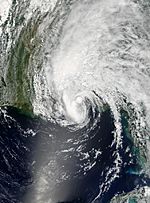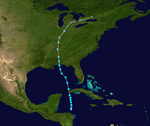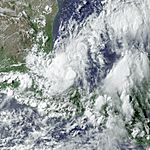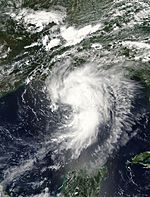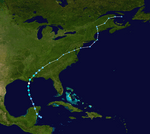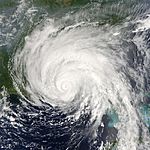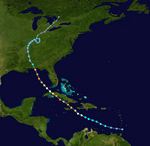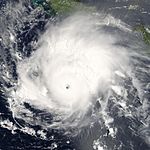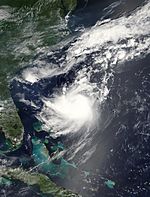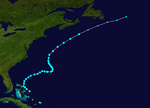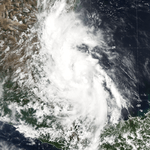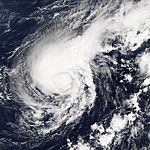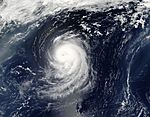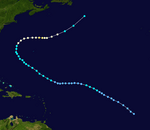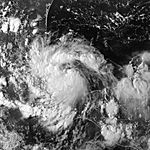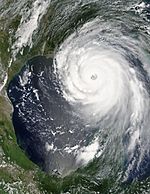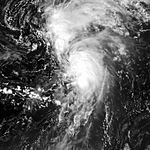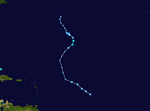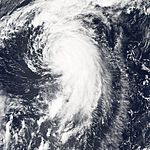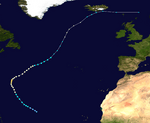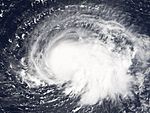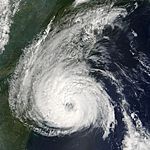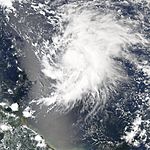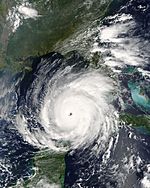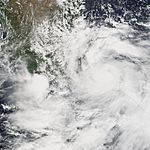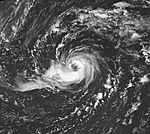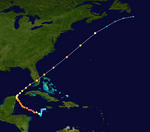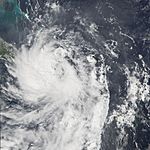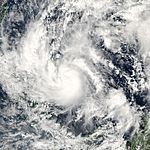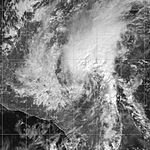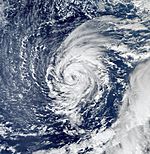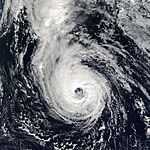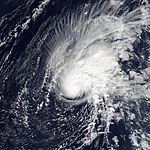Quick facts for kids
2005 Atlantic hurricane season
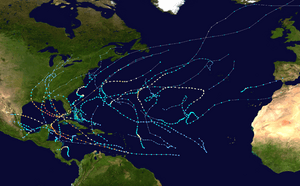 |
| Season summary map |
| First storm formed |
June 8, 2005 |
| Last storm dissipated |
January 6, 2006
(record latest, tied with 1954) |
| Strongest storm |
Wilma (Most intense hurricane in the Atlantic basin) – 882 mbar (hPa) (26.06 inHg), 185 mph (295 km/h) (1-minute sustained) |
| Total depressions |
31 (record high) |
| Total storms |
28 |
| Hurricanes |
15 (record high) |
| Major hurricanes (Cat. 3+) |
7 (record high, tied with 1961) |
| Total fatalities |
3,960 total |
| Total damage |
$180.7 billion (2005 USD)
(Second-costliest tropical cyclone season on record) |
Atlantic hurricane seasons
2003, 2004, 2005, 2006, 2007 |
| Related articles |
- 2005 Atlantic hurricane season statistics
- List of storms in the 2005 Atlantic hurricane season
- Timeline of the 2005 Atlantic hurricane season
|
The 2005 Atlantic hurricane season was a very busy time for storms in the Atlantic Ocean. It officially lasted from June 1 to November 30, 2005. During this period, hurricanes and tropical storms usually form.
The 2005 season broke many records. There were 28 tropical storms, though this record was later broken in 2020. Out of these, 15 became hurricanes. For the first time ever, forecasters had to use names from the Greek alphabet because all the regular storm names were used up.
The storm that caused the most damage was Hurricane Katrina. It hit New Orleans, USA, and sadly caused many deaths. However, the strongest storm of the season was Hurricane Wilma. Wilma was the most powerful hurricane ever recorded in the Atlantic Ocean, with a record-low pressure of 882 mbar.
Storms of the Season
|
2005 Atlantic hurricane season
|
|
|
STORM CLASSIFICATIONS: Numbers 1 - 5 show Hurricanes, from 1 (weakest) to 5 (strongest)
TS Tropical Storm | TD Tropical Depression | SS Subtropical Storm | SD Subtropical Depression
Tropical Storm Arlene
| Tropical storm (SSHS) |
|
|
| Duration |
June 8 – June 13 |
| Intensity |
70 mph (110 km/h) (1-min), 989 mbar (hPa) |
Arlene was the first storm of the season. It formed near Honduras on June 8. It then moved north towards western Cuba and entered the Gulf of Mexico. Arlene almost became a hurricane before hitting western Florida. It quickly weakened over land and became a leftover storm on June 13.
Tropical Storm Bret
| Tropical storm (SSHS) |
|
|
| Duration |
June 28 – June 30 |
| Intensity |
45 mph (75 km/h) (1-min), 1002 mbar (hPa) |
Tropical Storm Bret was a weak storm that formed in the western Gulf of Mexico. It quickly became Tropical Storm Bret. The storm hit Tuxpan, Veracruz, Mexico the next morning. It faded away on June 30. Bret caused 2 deaths and about $9 million in damage.
Hurricane Cindy
| Category 1 hurricane (SSHS) |
|
|
| Duration |
July 3 – July 7 |
| Intensity |
75 mph (120 km/h) (1-min), 991 mbar (hPa) |
Hurricane Cindy was the third named storm and first hurricane of 2005. It briefly reached hurricane strength in the Gulf of Mexico. Cindy made landfall in Louisiana. This hurricane caused 3 deaths and about $320 million in damage.
Hurricane Dennis
| Category 4 hurricane (SSHS) |
|
|
| Duration |
July 4 – July 13 |
| Intensity |
150 mph (240 km/h) (1-min), 930 mbar (hPa) |
Hurricane Dennis was a very strong hurricane, reaching winds of 150 mph. It traveled mostly northwest. Dennis hit Grenada, almost hit Jamaica, and also made landfall in Cuba and Florida in the United States.
Hurricane Emily
| Category 5 hurricane (SSHS) |
|
|
| Duration |
July 11 – July 21 |
| Intensity |
160 mph (260 km/h) (1-min), 929 mbar (hPa) |
Hurricane Emily was the strongest and only known Category 5 hurricane in July. It broke a strength record set by Hurricane Dennis just six days earlier. Emily was one of four Category 5 hurricanes in 2005. It caused about 17 deaths and over $1 billion in damage.
Tropical Storm Franklin
| Tropical storm (SSHS) |
|
|
| Duration |
July 21 – July 29 |
| Intensity |
70 mph (110 km/h) (1-min), 997 mbar (hPa) |
Tropical Storm Franklin formed north of the Bahamas on July 21. It moved across the western Atlantic, passing near Bermuda on July 26. Franklin later became a non-tropical storm near Newfoundland. It caused no damage or deaths because it stayed over the ocean.
Tropical Storm Gert
| Tropical storm (SSHS) |
|
|
| Duration |
July 23 – July 25 |
| Intensity |
45 mph (75 km/h) (1-min), 1005 mbar (hPa) |
Tropical Storm Gert was a weak and short-lived storm. It formed in the Bay of Campeche on July 23. The storm hit Mexico and faded away on July 25.
Tropical Storm Harvey
| Tropical storm (SSHS) |
|
|
| Duration |
August 2 – August 8 |
| Intensity |
65 mph (100 km/h) (1-min), 994 mbar (hPa) |
Tropical Storm Harvey was a strong tropical storm that moved across the Atlantic Ocean. It lasted from August 2 to August 8. Harvey caused no damage or deaths. It was the eighth named storm of the 2005 season and only affected Bermuda.
Hurricane Irene
| Category 2 hurricane (SSHS) |
|
|
| Duration |
August 4 – August 18 |
| Intensity |
105 mph (165 km/h) (1-min), 970 mbar (hPa) |
Hurricane Irene was a long-lasting storm, active for about two weeks. It took a while to become a hurricane. The only effects from Irene were large ocean waves. Irene caused no damage or deaths.
Tropical Storm Jose
| Tropical storm (SSHS) |
|
|
| Duration |
August 22 – August 23 |
| Intensity |
60 mph (95 km/h) (1-min), 998 mbar (hPa) |
Tropical Storm Jose was a strong but very short-lived storm. It quickly formed in the Bay of Campeche and made landfall in Mexico. Tropical Storm Jose faded the very next day. It caused 8 deaths and about $45 million in damage.
Hurricane Katrina
| Category 5 hurricane (SSHS) |
|
|
| Duration |
August 23 – August 30 |
| Intensity |
175 mph (280 km/h) (1-min), 902 mbar (hPa) |
Hurricane Katrina was a powerful Category 5 hurricane. It became the most expensive hurricane in U.S. history. Katrina caused huge damage along the U.S. Gulf Coast, especially in New Orleans, Louisiana. It broke the old record set by Hurricane Andrew. Katrina caused $125 billion in damage and led to 1,836 deaths.
Tropical Storm Lee
| Tropical storm (SSHS) |
|
|
| Duration |
August 28 – September 2 |
| Intensity |
40 mph (65 km/h) (1-min), 1006 mbar (hPa) |
Tropical Storm Lee formed east of the Lesser Antilles on August 28. It weakened into a tropical low the next day. The low then moved north and got stronger, briefly becoming a tropical storm on August 31. Lee quickly weakened again and was absorbed by a cold front on September 2.
Hurricane Maria
| Category 3 hurricane (SSHS) |
|
|
| Duration |
September 1 – September 10 |
| Intensity |
115 mph (185 km/h) (1-min), 962 mbar (hPa) |
Hurricane Maria was a major hurricane in September 2005. This storm was unusual because it affected places like New Jersey, Iceland, Scotland, and Norway. Hurricane Maria caused 3 deaths and about $3.1 million in damage.
Hurricane Nate
| Category 1 hurricane (SSHS) |
|
|
| Duration |
September 5 – September 10 |
| Intensity |
90 mph (150 km/h) (1-min), 979 mbar (hPa) |
Nate was a Category 1 hurricane. Hurricane Nate also contributed to one death in Bermuda and another in New Jersey, along with Hurricane Maria.
Hurricane Ophelia
| Category 1 hurricane (SSHS) |
|
|
| Duration |
September 6 – September 17 |
| Intensity |
85 mph (140 km/h) (1-min), 976 mbar (hPa) |
Hurricane Ophelia was a Category 1 hurricane in September of 2005. It moved in a strange way just off the coast of the United States. Ophelia caused 3 deaths and about $70 million in damage, mostly in North Carolina.
Hurricane Philippe
| Category 1 hurricane (SSHS) |
|
|
| Duration |
September 17 – September 23 |
| Intensity |
80 mph (130 km/h) (1-min), 985 mbar (hPa) |
Hurricane Philippe was a Category 1 hurricane that passed near land but did not cause direct impact. This was the third time a storm name starting with "P" was used.
Hurricane Rita
| Category 5 hurricane (SSHS) |
|
|
| Duration |
September 18 – September 26 |
| Intensity |
180 mph (285 km/h) (1-min), 895 mbar (hPa) |
Hurricane Rita was a powerful Category 5 hurricane. It started east of the Bahamas on September 18. It moved south of Florida and into the Gulf of Mexico. Rita quickly became a Category 5 hurricane. It then made landfall as a Category 3 hurricane in Texas on September 24. By September 26, Rita had faded over the U.S. The hurricane caused about 120 deaths and $10 billion in damage. This was only the second time an "R" name was used in the Atlantic.
Hurricane Stan
| Category 1 hurricane (SSHS) |
|
|
| Duration |
October 1 – October 5 |
| Intensity |
80 mph (130 km/h) (1-min), 977 mbar (hPa) |
Hurricane Stan was the sixth of seven storms in 2005 to hit Mexico. The storm caused $1 billion in damage in Mexico and the Central American region. The exact number of deaths is not fully known, but it is estimated to be around 1,660, possibly up to 2,000.
Tropical Storm Tammy
| Tropical storm (SSHS) |
|
|
| Duration |
October 5 – October 6 |
| Intensity |
50 mph (85 km/h) (1-min), 1001 mbar (hPa) |
Tammy was a tropical storm that lasted only two days. It caused minor damage in the southeastern United States. It reached its strongest point with 50 mph (85 km/h) winds just before hitting the northern Florida coast. Tammy formed from a strong non-tropical low on October 5. It moved north and made landfall at Atlantic Beach, Florida on October 6. Tammy faded shortly after. Most of the damage was about $30 million in losses. Tammy also caused 10 deaths. This was only the second time a storm name starting with "T" was used in the Atlantic Ocean.
Hurricane Vince
| Category 1 hurricane (SSHS) |
|
|
| Duration |
October 8 – October 11 |
| Intensity |
75 mph (120 km/h) (1-min), 988 mbar (hPa) |
Hurricane Vince was a very rare and unusual hurricane. It formed in a part of the Atlantic where the water was usually too cold for storms. It was only a hurricane for about six hours. The storm also did something very rare: it made landfall in Spain. This was the first time a storm name starting with "V" had been used in the Atlantic.
Hurricane Wilma
| Category 5 hurricane (SSHS) |
|
|
| Duration |
October 15 – October 25 |
| Intensity |
185 mph (295 km/h) (1-min), 882 mbar (hPa) |
Hurricane Wilma was the strongest hurricane ever recorded in the Atlantic Ocean. It was active from mid to late October 2005. Wilma caused $28.8 billion in damage, mostly in Florida and the Yucatán Peninsula.
Tropical Storm Alpha
| Tropical storm (SSHS) |
|
|
| Duration |
October 22 – October 24 |
| Intensity |
50 mph (85 km/h) (1-min), 998 mbar (hPa) |
Tropical Storm Alpha was the first tropical storm to get a Greek alphabet name. It caused 43 deaths in Haiti, the Dominican Republic, and the Bahamas. All of this happened before Hurricane Wilma absorbed Alpha on October 24.
Hurricane Beta
| Category 3 hurricane (SSHS) |
|
|
| Duration |
October 26 – October 31 |
| Intensity |
115 mph (185 km/h) (1-min), 962 mbar (hPa) |
Hurricane Beta was a Category 3 hurricane in late October 2005. It quickly grew stronger and made landfall in Nicaragua. It faded away on October 31. Beta caused about 4 deaths and $3 million in damage.
Tropical Storm Gamma
| Tropical storm (SSHS) |
|
|
| Duration |
November 14 – November 21 |
| Intensity |
50 mph (85 km/h) (1-min), 1002 mbar (hPa) |
Gamma was a tropical storm that started in mid-November. It crossed the Caribbean Sea and then faded. Tropical Storm Gamma reformed north of Honduras, before fading again. The tropical storm caused about 41 deaths in Honduras.
Tropical Storm Delta
| Tropical storm (SSHS) |
|
|
| Duration |
November 22 – November 28 |
| Intensity |
70 mph (110 km/h) (1-min), 980 mbar (hPa) |
Tropical Storm Delta was a strong tropical storm. It caused at least 7 deaths in the Canary Islands and about $360 million in damage. Its remains were last seen over Morocco.
Hurricane Epsilon
| Category 2 hurricane (SSHS) |
|
|
| Duration |
November 29 – December 8 |
| Intensity |
100 mph (155 km/h) (1-min), 981 mbar (hPa) |
Epsilon was a rare December hurricane. It was the first one since Hurricane Lili in 1984. Weather forecasters had trouble predicting when Epsilon would fade away. Epsilon did not come close to any land.
Tropical Storm Zeta
| Tropical storm (SSHS) |
|
|
| Duration |
December 30 – January 6 |
| Intensity |
65 mph (100 km/h) (1-min), 994 mbar (hPa) |
Tropical Storm Zeta was the last storm of 2005. It formed on December 30 over cold waters in the Atlantic. Tropical Storm Zeta faded on January 6, 2006. It was one of only two storms to exist in two different years. The storm did not affect land or cause any deaths or damage.
Other Storms
Besides the named storms, there were four other storms in 2005 that were not given names. These included Tropical Depression Ten, Tropical Depression Nineteen, Subtropical Depression Twenty-two, and a subtropical storm found later. A subtropical cyclone is a storm that is a mix between a tropical cyclone and an extratropical cyclone.
Retired Names
After the 2005 season, the names of five hurricanes were "retired" because of the serious damage they caused. These were Hurricane Dennis, Hurricane Katrina, Hurricane Rita, Hurricane Stan, and Hurricane Wilma. Their names were replaced with Don, Katia, Rina, Sean, and Whitney for future seasons, starting in 2011.
|
Tropical cyclones of the 2005 Atlantic hurricane season
|
|
|
|
|
|
Images for kids
-
Flooding in New Orleans following Hurricane Katrina
See also
 In Spanish: Temporada de huracanes en el Atlántico de 2005 para niños
In Spanish: Temporada de huracanes en el Atlántico de 2005 para niños

 In Spanish: Temporada de huracanes en el Atlántico de 2005 para niños
In Spanish: Temporada de huracanes en el Atlántico de 2005 para niños

